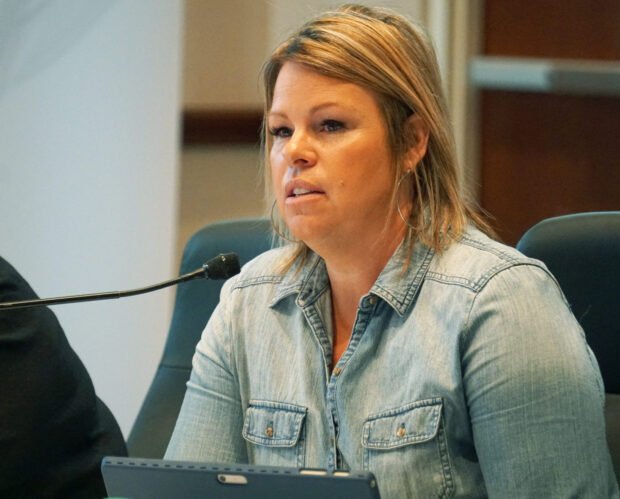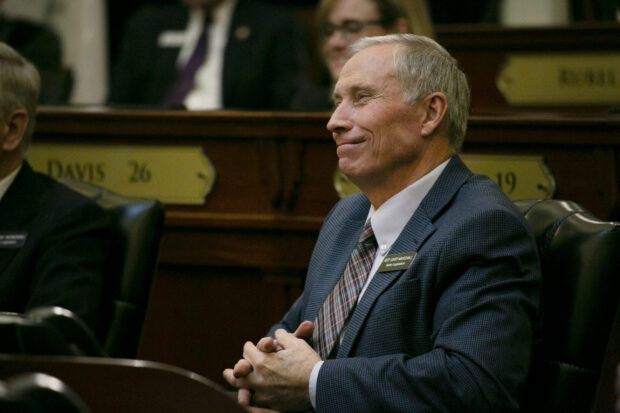Gov. Brad Little’s new school reopening committee has given itself a tight deadline to issue guidance to local officials who are developing fall plans.

Meeting remotely Monday, the Public Schools Reopening Committee, said it hopes to have nonbinding guidance put together next week, on June 30.
That would allow the committee to finalize guidance to distribute to trustees and local school officials after the July 4 weekend.
State Board of Education President Debbie Critchfield, the chair of the committee, said the goal is to produce a short, easy-to-understand guide.
Using the design and template of a plan from Georgia, Critchfield envisions a report in the ballpark of 10 pages.
It would cover items such as operations, staffing and student learning. But it’s also likely to address how local school leaders can determine where their community stands amid the coronavirus outbreak.
“I hope it becomes a document where, as things change, that a superintendent and school board could pull this out and say, ‘This is where we see ourselves, what are the things we need to be talking about and who are the right people to be talking to?’” Critchfield said.
The State Board is giving local school trustees the go-ahead to create their own fall reopening plans.
“We want to emphasize local governance, but we also want to provide the tools to help support that,” Critchfield said.
To assemble guidance by June 30, the committee will work quickly.
The committee has split into smaller subcommittees, which have already met. It is also already piecing together a draft of its guidance.
“That June 30 deadline, it’s creeping up on us, it’s June 22, that is why this week is very, very critical,” said Greg Wilson, Little’s education adviser. “We want our work done by the middle of next week so that we can polish everything up, get everything ready and get it out to districts the following week.”
The committee will meet again Thursday, and may review a draft of the guidance.
Interim committee begins looking at standards
As expected, a new legislative interim committee signaled it intends to call for replacing Idaho’s academic standards.
But the Idaho Content Standards Interim Committee announced during its first meeting Monday at the Statehouse that it will not be the group that actually rewrites the standards. Instead, different groups that include educators will work with the State Department of Education to write any proposed standards. Those groups will get to work next week.
Sen. Steven Thayn, R-Emmett, said the legislative interim committee met Monday in order to get ahead of the SDE standards committees. This allows them to monitor the SDE committees and give them advance guidance and ongoing feedback.
Academic standards have been a source of controversy during four the past five legislative sessions. Earlier this year, the House Education Committee voted to repeal all academic standards before the Senate Education Committee overruled this decision.
Rep. Gary Marshall, R-Idaho Falls, said the standards debate has become too political.

“Folks, we’ve got to de-politicize our content standards in the state of Idaho,” Marshall said. “As a Legislature we can’t keep coming back every year with divisiveness, anger on the part of parents and, in some cases, teachers and students over the content standards.”
The committee spent two full hours Monday having its members take turns restating and dissecting a three-page letter that legislators sent to Gov. Brad Little, the SDE and the State Board of Education earlier this year calling for replacing standards.
Rep. Dorothy Moon, R-Stanley, said it is important the standards are rewritten so they are based on science and don’t portray Idaho businesses and industries in a negative light.
“When we start to indicate that some industries are not advantageous to the Earth or to humans or however you want to put it, but sometimes there is that political bent to it,” Moon said.
“That needs to be looked at it with a fine-toothed comb on the politicization of different careers and industries in this state that are not looked upon favorably currently in some of the science standards.”
Rep. John McCrostie, D-Garden City, a music teacher, pointed out that most of the people who testified at Statehouse hearings earlier this year favored keeping the standards in place.
“Certainly there was a majority, and a solid majority, of folks in Idaho and professionals in the field that felt like standards for math in particular, since that is what we are discussing, are working like they are supposed to,” he said.
“It does not appear, again, from public testimony, that everything is wrong with Idaho math content standards.”
